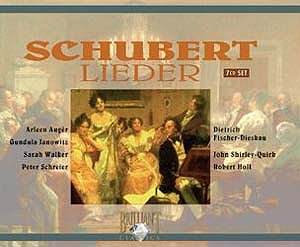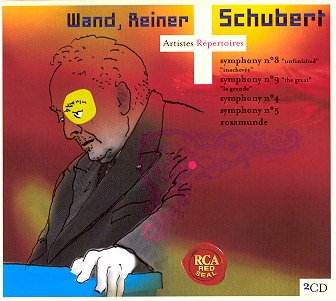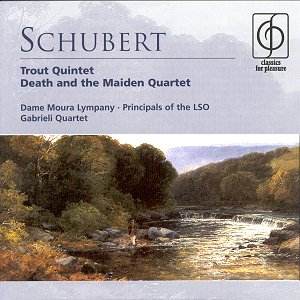 Franz Schubert: Lieder 7CD Collection
Franz Schubert: Lieder 7CD Collection
Performers: Peter Schreier, Robert Holl, John Shirley-Quirk, Gundula Janowitz, Arleen Augér, Sarah Walker, Dietrich Fischer-Dieskau
Piano Accompanists: Walter Olbertz, Naum Grubert, Steuart Bedford, Charles Spencer, Roger Vignoles, Hartmut Höll
Recording Dates: 1974, 1995, 1977, 1989, 1978, 1989, 1987
Label: Brilliant Classics
Price: £19.99 (Crotchet), £15.99 (Amazon UK), $23.72 (Amazon US)
Total Duration: Approx. 430 min.
The seven-disc collection of Schubert’s lieder from Brilliant Classics serves both as a commendable introduction for newcomers and a rich resource for seasoned aficionados of the composer’s intimate song repertoire. Schubert (1797-1828), a towering figure of the Romantic era, revolutionized the art song—or lied—through his ability to fuse text and music in a manner that expresses profound emotional depths. This set, encompassing the essential cycles Die schöne Müllerin, Die Winterreise, and Schwanengesang, alongside four additional recitals, merits attention for both its artistic merits and its historical significance.
Among the standout performances, Peter Schreier’s Die schöne Müllerin serves as a touchstone of interpretation. Schreier’s tenor, characterized by clarity and emotional resonance, navigates the cycle’s intricate emotional landscape with finesse. His rendition of “Das Wandern” demonstrates a deft balance of lyrical phrasing and rhythmic buoyancy, a hallmark of his approach, where each note is imbued with the youthful exuberance of the miller’s journey. This is an interpretation that recalls the legendary recordings of the cycle by Dietrich Fischer-Dieskau, albeit with a more youthful and less introspective character. Schreier’s ability to seamlessly transition from the buoyancy of “Das Wandern” to the poignant “Trockne Blumen,” where he showcases a nuanced understanding of Schubert’s harmonic language, is particularly commendable.
Robert Holl’s Die Winterreise offers a contrasting interpretation. While Holl may not reach the profound depths achieved by Fischer-Dieskau, whose legendary recordings often evoke a visceral engagement with the cycle’s existential themes, Holl’s baritone possesses a rich timbre and an impressive command of dynamics. His rendition of “Der Lindenbaum” is noteworthy for its lyrical warmth, yet it is in the more vigorous songs like “Die Wetterfahne” where Holl’s voice truly shines, conveying a sense of urgency that articulates the wanderer’s despair. However, in the quieter moments, such as “Einsamkeit,” slight vocal fragility becomes apparent, occasionally detracting from the overall emotional impact.
The performance of Schwanengesang by John Shirley-Quirk presents a darker, more introspective approach. His baritone resonates with the cycle’s inherent melancholy, particularly in “Der Doppelgänger,” where his mastery over dynamics and phrasing elicits the haunting qualities of Schubert’s music. Shirley-Quirk’s interpretation echoes the expressive depth found in Fischer-Dieskau’s readings while infusing the performance with a distinct dramatic flair that is uniquely his own.
Among the recital discs, Gundula Janowitz’s selections reveal a soprano voice that possesses both clarity and a delightful warmth. Her rendition of “Der Winterabend,” a piece that showcases Schubert’s gift for lyrical melancholy, is transcendent. Janowitz’s ability to convey the emotional weight of the text through subtle tonal variations and skillful breath control stands out, particularly in the extended phrases that demand both technical and expressive prowess.
Arleen Augér’s Goethe-Lieder is another gem within this collection. Her ethereal voice shines in pieces like “Gretchen am Spinnrade,” where her interpretation captures the turmoil of Gretchen’s emotions with delicate nuance. Augér’s command over the high register is particularly striking in “Gretchens Bitte,” demonstrating both her technical range and her interpretative insight into the character’s longing.
Sarah Walker’s contributions, particularly in more forceful pieces such as “Der Musensohn,” reveal a mezzo-soprano with a commanding presence. Though her interpretation occasionally veers toward the overly emphatic—most notably in “Die Sterne”—her overall expressivity and vocal power are well-suited to Schubert’s dramatic contours.
Finally, the inclusion of 16 Lieder by Dietrich Fischer-Dieskau, despite its recording being from the later stages of his illustrious career, reaffirms his reputation as one of the preeminent interpreters of Schubert’s songs. Fischer-Dieskau’s experience allows him to imbue each phrase with an emotional depth that transcends vocal imperfections. His interpretation of “Nacht und Träume” remains a testament to his artistry, as he navigates the delicate interplay of light and shadow within Schubert’s music.
The engineering quality across these recordings generally maintains a high standard, with clarity in both vocal lines and piano accompaniment. Yet, some tracks, particularly those from earlier sessions, reveal slight limitations in resonance and balance, which is to be expected given the variety of recording conditions.
In conclusion, this 7CD anthology serves not only as an accessible entry point into Schubert’s lieder but also as a collection that highlights the distinctive interpretative choices of some of the finest singers of the late 20th century. While not every performance reaches the zenith of artistry found in the most celebrated interpretations, the cumulative experience of this set provides a rich tapestry of vocal and pianistic brilliance that is both satisfying and enlightening. For anyone wishing to explore the depths of Schubert’s song repertoire, this collection is not merely recommended but essential.



